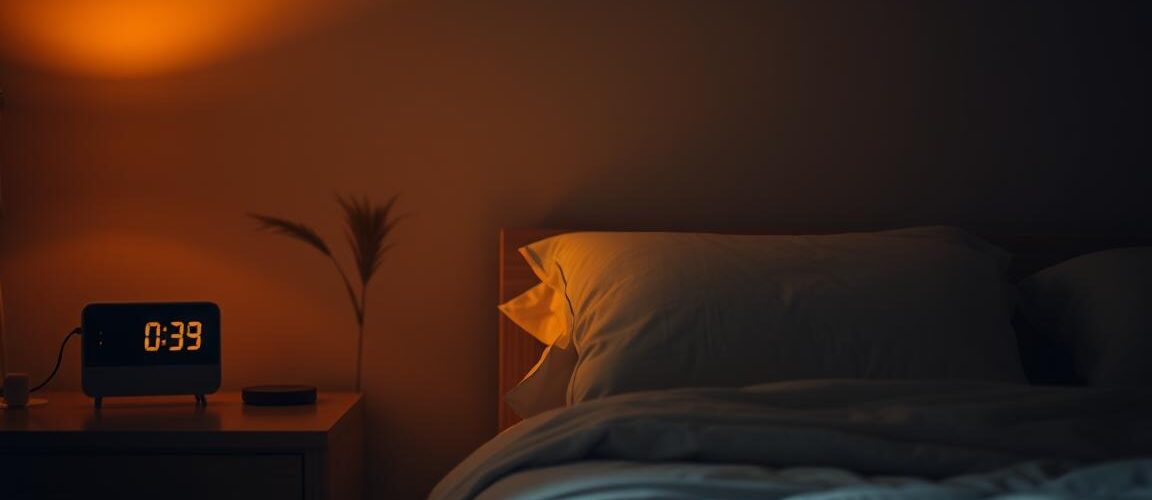Are you tired of feeling exhausted and fatigued due to irregular work schedules? Do you struggle to get quality rest despite trying various remedies?
Irregular schedules can mess up your body’s natural circadian rhythms. This can lead to shift work sleep disorder and other sleep problems.
We all need 7-9 hours of sleep for our health. In this guide, we’ll share tips for shift workers to better their sleep and health.
Key Takeaways
- Establish a consistent sleep schedule
- Create a sleep-conducive environment
- Avoid stimulating activities before bedtime
- Use light therapy to regulate your circadian rhythms
- Limit caffeine and nicotine intake
Understanding Sleep Hygiene for Shift Workers
For shift workers, knowing about sleep hygiene is key. They often find it hard to stick to a regular sleep schedule.
Working shifts can mess with your body’s natural sleep cycle. This can make it tough to fall asleep, stay asleep, and get good rest. Such problems can affect your health and work performance.
What Makes Shift Work Sleep Different
Shift work sleep is unique because of the odd hours it involves. These hours clash with our natural body clock. Our body clock is set by light and dark, making it hard for shift workers to adjust.
Key differences include:
- Irregular sleep schedules
- Conflict with the natural circadian rhythm
- Difficulty adjusting to new sleep-wake cycles
The Impact on Circadian Rhythm
The circadian rhythm is key to our sleep cycle. Shift work can mess with this rhythm, causing health problems. The National Sleep Foundation says shift workers are more likely to have sleep disorders because of their schedules.
This rhythm disruption can lead to insomnia, digestive issues, and a higher risk of chronic diseases.
Common Sleep Challenges for Shift Workers
Shift workers face many sleep issues. These include trouble falling asleep, staying asleep, and getting quality rest. These problems come from irregular schedules and how our body reacts to light and dark.
| Sleep Challenge | Description | Potential Solution |
|---|---|---|
| Difficulty Falling Asleep | Struggling to initiate sleep due to irregular schedules | Establish a relaxing pre-sleep routine |
| Staying Asleep | Waking up during the sleep period and having trouble returning to sleep | Create a sleep-conducive environment |
| Quality Sleep | Experiencing poor quality sleep despite adequate sleep duration | Manage light exposure and avoid stimulating activities before bedtime |
Creating Your Ideal Sleep Environment
A well-designed sleep environment can greatly improve sleep for those with non-traditional work hours. It means making your bedroom sleep-friendly. This helps you relax and keeps distractions away.
To make your bedroom sleep better, control what affects your sleep. Keep it cool, dark, and quiet. A cooler room helps you sleep better. Darkness helps your body’s clock stay in sync. Use blackout curtains or shades for this.
Noise is also key. Reduce outside noise with earplugs, white noise machines, or soundproofing. Good bedding and pillows are also important for a good night’s sleep.
Here are more tips for a sleep-friendly room:
- Take out TVs and computers from your bedroom.
- Try aromatherapy, like lavender, for calm.
- Keep your bedroom tidy and organized.
By following these tips, shift workers can make their sleep space better. This leads to better sleep and overall health.
Managing Light Exposure for Better Sleep
Understanding how light affects our sleep is key to better sleep hygiene. Light exposure greatly impacts our sleep quality. Our bodies naturally respond to light and darkness, helping us sleep and wake.
Light affects our circadian rhythms, with both natural and artificial light playing roles. Knowing how to manage these lights is vital for better sleep.
Natural Light Management
Natural light is a powerful sleep regulator. It helps our bodies sync with the day-night cycle, promoting healthy sleep. To manage natural light well:
- Get morning natural light to boost your circadian rhythm.
- Take outdoor breaks during the day, if working indoors.
- Keep curtains or blinds open to let natural light in.
Artificial Light Solutions
Artificial light can mess with our sleep, mainly in the evening. The goal is to lessen its impact on sleep:
- Use dim red lights in the evening to avoid disrupting your rhythm.
- Stay off screens an hour before bed or use blue light filters.
- Dim your lights as bedtime gets closer.
Using Light Therapy Effectively
Light therapy uses specific light to treat sleep issues. It’s great for those with irregular sleep or night shifts.
To use light therapy well, consider the following:
| Therapy Type | Purpose | Timing |
|---|---|---|
| Bright Light Therapy | Regulates circadian rhythms | Morning or as prescribed |
| Blue Light Therapy | Improves alertness | During work periods, specially at night |
Effective light management can greatly improve sleep quality. This includes natural light, artificial light solutions, and light therapy when needed.
Developing a Pre-Sleep Routine That Works
A good pre-sleep routine can really help shift workers sleep better. It’s not just about what you do before bed. It’s also about making a pattern that tells your body it’s time to sleep.
To make a great pre-sleep routine, focus on relaxing activities. Reading, meditation, and deep breathing exercises are top choices. They calm your mind and body, making it easier to fall asleep.
Remember, timing is key. Start winding down 30 minutes before bed. This lets your body relax slowly. A consistent routine helps regulate our internal clock, even when working irregular hours.
Other activities to add to your routine include:
- Listening to soothing music
- Taking a warm bath
- Engaging in gentle stretches
- Using aromatherapy
Adding these activities to your routine can boost your sleep quality and overall health.
Nutrition Strategies for Quality Sleep
Nutrition is key to good sleep. Eating foods rich in sleep nutrients can boost sleep quality. Let’s look at how nutrition can help us sleep better.
Understanding how foods affect our body is important. Some foods help us relax and sleep, while others can mess with our sleep. For more on sleep hygiene, check out our article on sleep hygiene practices to improve quality and restfulness.
Timing Your Meals
When we eat can affect our sleep. Eating a big meal before bed can mess with our sleep. Eating too early can make us hungry at night. Finding the right timing is key.
Eating dinner 2-3 hours before bed is a good rule. This lets our food digest and keeps us comfortable at night.
Best Foods for Sleep
Some foods are better for sleep than others. These include foods with tryptophan, melatonin, and other sleep nutrients.
| Food | Sleep-Promoting Nutrient | Benefit |
|---|---|---|
| Turkey | Tryptophan | Promotes relaxation and sleepiness |
| Cherry | Melatonin | Regulates sleep-wake cycle |
| Milk | Tryptophan, Calcium | Promotes relaxation and reduces stress |
Foods and Drinks to Avoid
Some foods can mess with our sleep. Caffeine, alcohol, and spicy foods are common sleep disruptors.
It’s not just about avoiding these foods. It’s also about when we eat them. Drinking caffeine late in the day can make it hard to fall asleep.
Being mindful of what we eat can improve our sleep. This, along with other sleep habits, can lead to better rest and health.
Physical Activity and Sleep Quality
Regular physical activity is key for better sleep quality in shift workers. Exercise helps regulate sleep patterns. But, timing is critical to avoid disrupting sleep.
Exercise affects sleep in many ways. It can lower stress and anxiety, common in shift workers. Yet, exercising too close to bedtime can make it hard to sleep. Timing is everything when it comes to physical activity and sleep.
To get the most from exercise for sleep, try these tips:
- Plan your workouts for the right time. Avoid intense exercise 2-3 hours before bed.
- Try relaxing exercises like yoga or stretching near bedtime to relax your body.
- Choose an exercise you love and can do regularly.
| Exercise Timing | Impact on Sleep |
|---|---|
| Morning/Afternoon | Can help regulate sleep patterns |
| Evening (within 2-3 hours of bedtime) | Can disrupt sleep due to increased body temperature and stimulation |
| Relaxing exercises before bed | Can help with relaxation and prepare the body for sleep |
Adding physical activity to your day and paying attention to timing can boost sleep quality. Try different schedules to see what works for you.
Consistency is important. Regular exercise improves sleep hygiene and overall health. By prioritizing physical activity, you can greatly enhance your sleep quality.
Managing Your Body Clock on Rotating Shifts
Managing our body clock is key when we work rotating shifts. It affects our sleep quality and well-being. Rotating shifts can mess with our natural sleep-wake cycle. But, with the right planning and strategies, we can adjust our body clock and sleep better.
Adjustment Strategies
Adjusting to rotating shifts is a big challenge. We need to be careful with our sleep schedule and daily routines.
Some effective strategies include:
- Gradually adjusting our sleep schedule before starting a new shift
- Using light therapy to regulate our circadian rhythms
- Maintaining a consistent sleep schedule, even on days off
By using these strategies, we can lessen the impact of rotating shifts and sleep better.
Schedule Planning
Planning our schedule is vital when we work rotating shifts. It’s not just about our work hours but also our sleep and daily activities.
Here are some tips for planning:
- Plan our sleep schedule around our work shifts
- Set reminders for sleep times and daily routines
- Be flexible and adaptable when our schedule changes
Effective planning helps us deal with rotating shifts better and improves our quality of life.
Recovery Periods
Recovery periods are essential when we work rotating shifts. They give our body time to recover from the stress of these shifts.
Here are some ways to make the most of recovery periods:
- Take breaks and rest when needed
- Do relaxing activities, like reading or meditation
- Get enough sleep and eat healthy
By using these strategies, we can lessen the negative effects of rotating shifts and feel better overall.
Creating Boundaries with Family and Social Life
Shift workers face a big challenge: setting boundaries with family and friends to rest well.
It’s hard to mix work with family and social life. To sleep well, we must set clear limits with our loved ones and friends.
Telling our family and friends about our sleep schedule is key. We should share when we sleep and when we’re free for socializing. This way, they know when to reach out and respect our rest.
Setting Boundaries Around Sleep Time
To sleep better, we need to protect our sleep hours. This means:
- Telling our family and friends about our sleep schedule
- Asking them not to call or visit when we sleep
- Having special times for family and friends
By doing this, we can keep our work life from affecting our family and friends. And we’ll sleep better too.

Using Sleep Technology and Tools
The right sleep technology can change the game for shift workers. It helps us manage our sleep better. Now, we have many tools to improve our sleep habits.
Tracking and monitoring our sleep patterns is a big area where technology helps a lot.
Sleep Tracking Devices
Sleep tracking devices are gadgets that watch our sleep. They give us insights into how well we sleep. They track how long we sleep, the sleep stages, and even our heart rate.
Smartwatches and fitness trackers are popular for this. They help us see our sleep patterns and make changes if needed.
Blackout Solutions
It’s important to have a dark sleep space. Blackout curtains or shades block out light. This makes it easier to fall asleep.
Sleep masks are another option. They block light from windows while we sleep.
White Noise Machines
White noise machines help improve sleep too. They make a constant sound that covers up other noises. This helps us sleep better.
Some machines play sounds like rain or ocean waves. These sounds create a calm sleep space.
Using these sleep technologies can greatly improve our sleep and well-being.
Handling Emergency Shifts and Schedule Changes
Dealing with sudden schedule changes and emergency shifts needs flexibility and planning. As shift workers, we often have to adjust to new schedules quickly. This can affect our sleep quality and well-being.
To manage these changes well, we need strategies. Keeping a flexible sleep schedule is key. This means adjusting our bedtime based on our work schedule.
Strategies for Managing Emergency Shifts:
- Prioritize rest when you’re not working
- Use light exposure to your advantage by getting natural light during the day if you’re working a night shift, or vice versa
- Stay hydrated and eat nutritious food to maintain energy levels
- Communicate with your family and friends about your schedule changes to ensure they understand your needs
When an emergency shift comes up, having a plan for sleep is helpful. This could mean taking a nap before your next shift or adjusting your sleep environment to rest better.
| Strategy | Benefit |
|---|---|
| Adjusting sleep schedule | Improves sleep quality |
| Managing light exposure | Helps regulate circadian rhythm |
| Staying hydrated and eating well | Maintains energy levels |
Being proactive and having the right strategies can help us deal with emergency shifts and schedule changes. This way, we can keep our sleep and health in check.
Using technology, like sleep tracking devices, can also help. These tools can monitor our sleep and show us how to improve. By using these tools and being flexible with our sleep, we can handle shift work better.
Natural Sleep Aids and Supplements
For shift workers, natural sleep aids and supplements can be a big help. They often have trouble sleeping because of their work schedules. Just following good sleep habits might not be enough.
Melatonin is a popular sleep supplement. It helps keep your body’s sleep cycle in check.
Safe Supplement Options
Some natural sleep aids and supplements are safe to take. But, it’s important to know how they work and if they can mix with other medicines. Here’s a list of some common ones:
| Supplement | Description | Potential Benefits |
|---|---|---|
| Melatonin | Regulates sleep-wake cycles | Improves sleep quality, reduces sleep latency |
| Valerian root | Promotes relaxation, reduces stress | Improves sleep quality, reduces sleep fragmentation |
| Chamomile | Soothes and calms the mind and body | Promotes relaxation, improves sleep quality |
When to Consider Supplements
While supplements can help, they shouldn’t be the only thing you rely on for sleep. They work best when used with good sleep habits. This includes going to bed and waking up at the same time every day and making your bedroom a sleep-friendly space.
Consulting Healthcare Providers
Always talk to a doctor before starting any supplements. They can guide you on what’s best and make sure it won’t harm you or mix badly with other medicines.
With the right approach and advice, shift workers can get better sleep. This can greatly improve their health and happiness.
Managing Sleep During Different Seasons
The changing seasons affect how we sleep. There are ways to make our sleep better. For example, winter’s cold and short days can mess with our sleep.
In winter, many people don’t sleep well. This is because we get less natural light. Using light therapy can help. It mimics natural light to keep our body clocks in sync.

Summer has its own sleep challenges. The heat and long days make it hard to sleep. To help, we can use cooling sleep technologies. We can also adjust our sleep times to fit the later sunsets.
There are some general tips for better sleep, no matter the season. Keep a regular sleep schedule and make your bedroom sleep-friendly. Also, avoid activities that get you excited before bed. By using these tips, we can sleep better and feel better overall.
In spring and autumn, when daylight hours change a lot, we can adjust our sleep. We might change our sleep times or use sleep tracking devices to keep an eye on our sleep.
Conclusion: Making Sleep Hygiene a Priority
Making sleep hygiene a top priority is key for shift workers to boost their health and happiness. By setting up a great sleep space, managing light, and having a bedtime routine, they can sleep better. This improves their overall sleep quality.
Good sleep habits help avoid sleep disorders and health problems. We urge shift workers to focus on their sleep health every day. This is vital for their well-being.
By prioritizing sleep, shift workers can sleep better, work more efficiently, and face fewer sleep issues. Small changes can lead to big improvements in sleep quality.
It’s more than just getting enough sleep; it’s about caring for your overall health. By following these tips, shift workers can start a journey towards a healthier, more balanced life.



